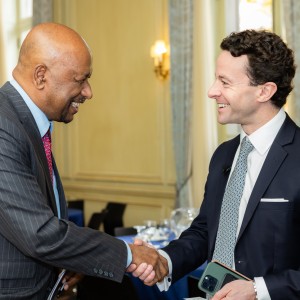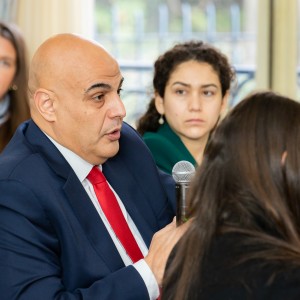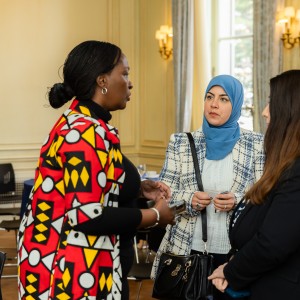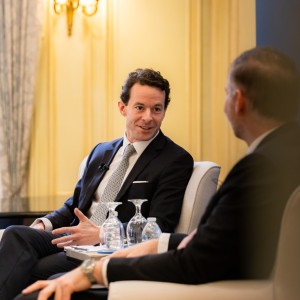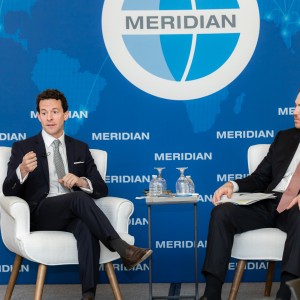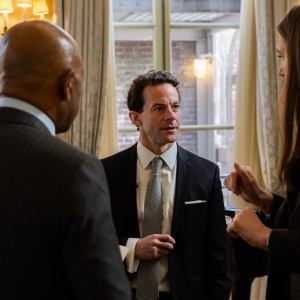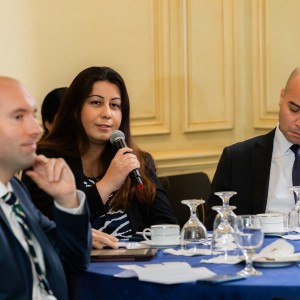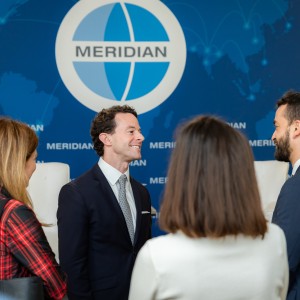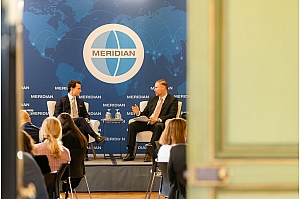The Road to COP28: Insights@Meridian with David W. Livingston, Senior Advisor and Managing Director for Energy for the U.S. Special Presidential Envoy

As global delegations prepare for the 2023 United Nations Climate Change Conference, anticipation and hope for collaborative efforts in addressing pressing climate change issues transcend the myriad challenges that persist on the world stage. COP28 represents a unique opportunity for nations to unite in commitment to sustainable practices and environmental stewardship. Amidst the complexities of our time, where diverse nations converge with the shared goal of forging a resilient and cooperative path towards a more sustainable future.
On November 17, 2023, in partnership with Capstone, Meridian hosted David Livingston, Senior Advisor and Managing Director for Energy for the U.S. Special Presidential Envoy for Climate John Kerry, for an Insights@Meridian discussion moderated by Eric Scheriff, Managing Director, Capstone on energy and industry on the road to COP28.
Here are some top takeaways from the program:
1. Marking the Largest U.S. Delegation in COP History
The United States will arrive to Dubai in full force for COP28. Showcasing renewed dedication to climate action, COP28 is poised to welcome the conferences largest ever U.S. delegation. Livingston emphasized the intricate nature of COP, likening it to a “multilayer cake,” comprised of multifarious events, activities, and discussions to advance climate dialogue. Inside core discussions, the U.S. will engage on driving forward international agreements, including the Paris Accords. Securing consensus outcomes on the key mandated workstreams, global stock take, adaptation goals, and provisions for loss and damage, will be of utmost importance to U.S. negotiators. On the sidelines, there will be several different meetings and conferences, including the Conference of Youth (COY). Beyond formal agreements, the U.S. aims to drive progress across various sectors towards meeting the Paris Agreement goal of keeping global warming below 1.5 degrees Celsius.
2. Private Sector as Climate Allies
Acknowledging the significant involvement of the oil and gas sectors at COP28, Livingston highlighted the opportunity and great need to engage the private sector as allies in this work. Embassy representatives in attendance were called upon to encourage their respective private sectors to join initiatives like the First Movers Coalition, leveraging purchasing power of companies to reduce emissions across hard-to-abate sectors. Private sector involvement, particularly in blended finance tools, is vital for de-risking investments and fostering collaboration between public and private entities. Industry has a significant role to play, as sectors such as manufacturing, energy, and technology play a pivotal role in driving innovation and implementing sustainable, scalable, and impactful climate action.
3. Turning Pollution Into Profit
Rather than perceiving hard-to-abate sectors as burdens, there is a call to view them as opportunities for innovation. Sectors such as transportation, aviation, steel, cement, and shipping present avenues for profitable sustainable solutions. While widely recognized as a sector affected by pollution, investment in agricultural innovation—exemplified by joint initiatives like AIM for Climate—has the potential to address climate change and global hunger while generating climate-smart agriculture and markets for clean energy. Similar initiatives like the Green Shipping Challenge underscore the role of public-private sector collaboration in building sustainable industry infrastructure.
4. Eliminating Barriers for Developing Nations
Developing nations, bearing the disproportionate impact of climate change, grapple with unique challenges, particularly in mitigation and adaptation. The intersection of carbon emissions from industrialized nations with the vulnerabilities of developing nations underscores the need for a nuanced and technologically inclusive approach that recognizes the evolving landscape of economies and emissions. Specific challenges faced by countries like Pakistan, small island nations, and in sub-Saharan Africa call for tailored solutions that align with individual circumstances. The biggest barrier remains a lack of financial capacity. The emphasis is on private-public partnerships and initiatives like PREPARE, which seek to forge climate resilience through adaptation financing, humanitarian assistance, and capacity building for vulnerable populations. The global community is called upon to collectively modernize thinking about these challenges and to actively engage in solutions that go beyond traditional distinctions.
5. De-risking Investments and Mobilizing Capital
Addressing the financial barriers to climate action, Livingston emphasized the imperative for industrialized nations to take a leading role in de-risking investment in clean energy. The Energy Transition Accelerator emerges as a catalyst, aiming to mobilize private capital to expedite the transition to clean energy using voluntary crediting mechanisms and other tactics. The Inflation Reduction Act operates as America's Lab for Clean Tech Commercialization, envisioning CO2 reduction not only domestically but also on a global scale. Blended finance tools bridge the gap between public and private investments, with a significant commitment from private sector banking giant Goldman Sachs incentivizing trillions of dollars in clean energy investments worldwide. These endeavors underscore the collective responsibility of developed nations to de-risk investments and facilitate the flow of commercial capital into regions like Pakistan, India, and Brazil, where green renewable energy opportunities await.
Project summary
| The Road to COP28: Insights@Meridian with David W. Livingston, Senior Advisor and Managing Director for Energy for the U.S. Special Presidential Envoy | November 2023 | |
|---|---|
| Regions: | Africa, East Asia and Pacific, Europe and Eurasia, Near East and North Africa, Western Hemisphere |
| Impact Areas: | Energy and the Environment, Foreign Policy, Public Diplomacy |
| Program Areas: | Diplomatic Engagement |
